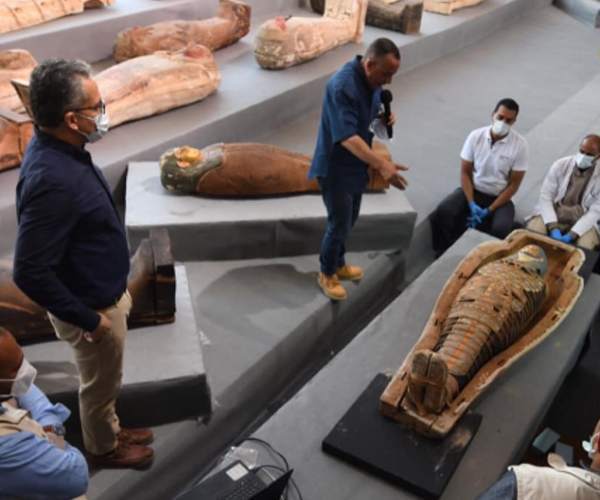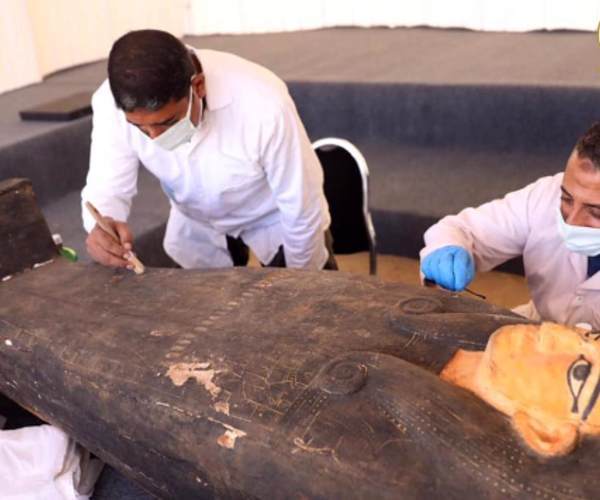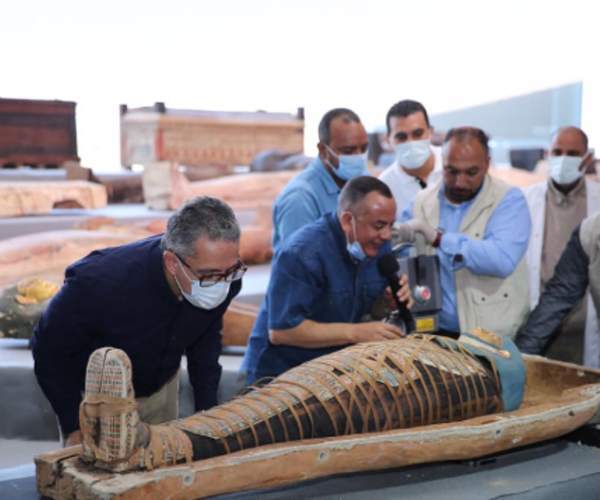
Saqqara Necropolis has not failed to surprise us more than once with many concealed secrets. One hundred coffins that are intact, sealed and painted have been unveiled inside three newly discovered burial shafts of 10 to 12 meters deep, dug more than 2,500 years ago. The Saqqara Necropolis has kept hidden for all these centuries the royal and noble tombs.
This marks the discovery of over 150 coffins uncovered so far, including the first discovery in October of 59 coffins. This number exceeds all expectations and with that being that, the excavation work has not even finished! The latest discovery dates back to the Late Period of ancient Egypt and the Ptolemaic Period. There was also a discovery of over 40 statues of deities, funerary masks, gilded masks and two wooden status, in addition to the coffins. These discoveries will be distributed amongst a number of different museums, and they consist of: The Grand Egyptian Museum, the National Museum of Egyptian Civilization and the Egyptian Museum in Tahrir and the New Capital Museum.
One of the reasons the new findings are so well-preserved is believed to be because they belonged to people of a higher class, as the designs and paintings are still visible even though they were interred more than 2,500 years ago in burial shafts. Some of these coffins contained mummies and they were put on display at the Saqqara Necropolis shortly after their discovery.
One of Ancient Egypt’s biggest discoveries
This ongoing excavation is truly exciting and quite exquisite as we are learning more and more day by day about some of the most important findings that history has to offer. Archaeologists opened one of the coffins to x-ray the mummy inside and demonstrate how it has been preserved. The X-ray showed the mummy was a male around 5’4” to 5’7” tall and was in a good health condition during his life-span. The X-ray also showed that he most likely died between the age of 40 to 45. The Egyptologist who performed the scan said that the deceases was perfectly mummified with his arms crossed over his chest in a position known in ancient Egypt as the ‘Osiris Shape’.
With the artifacts moved to several museums across Egypt, we are given the opportunity to be a part of this by having the ability to visit any of the aforementioned museums to discover more about the Saqqara Necropolis findings. Whether you reside in Egypt or anywhere else in the world, there is no question that visiting and learning about all these newly discovered coffins will be quite the experience that you shouldn’t miss.
El-Anany has informed us that archaeologists will continue to excavate the grounds and that this discovery will not be the last of its kind. In having said so, he also said that a new archaeological finding in Saqqara Necropolis will be revealed before the end of this year.
In April, the first batch of mummies was discovered in a shaft at Saqqara. The initial discovery was very important because it proves that Saqqara was the main burial of the 26th Dynasty. September marks the month when they had discovered 13 coffins piled up on top of each other in a well. Later in October, researchers discovered a large number of unopened sarcophagi at the site. Dating back to Egypt’s First Dynasty, the vast burial ground was once the royal capital of Memphis and is also home to the country’s oldest surviving pyramid.

With the Coronavirus pandemic putting tourism on hold and it being an integral part of the economy, Egypt has been eager to attract visitors back to its archaeological sites, and these findings are a big step in that direction.
A press conference was held on October 3rd in Saqqara Necropolis, where Egypt’s Minister of Tourism and Antiquities; Khaled El-Anany opened of the coffins in front of ambassadors and media representatives. This group of foreign ambassadors come from 43 countries and also 200 media representatives were present who were introduced to a new part of Egypt’s great civilization. El-Anany mentioned how proud he is of these discoveries having been made by Egyptian teams on Egyptian soil and that the pandemic did not stop his colleagues from unearthing more treasures in the Saqqara Necropolis. At the press conference was acclaimed Egyptian Egyptologist Zahi Hawass who said to the Secretary General of the Supreme Council of Antiquities Mostafa Waziri, “You brought me back to action”.

Another announced discovery for the Egyptian archaeological mission headed by Mostafa Waziry is a carved bronze statue of the God Nefertum in Saqqara Necropolis. The statue is inlaid with precious stones, red agate, turquoise and lapis lazuli. The statue stands 35 cm tall and has the name of its owner engraved on its base; BadiAmunis. Mostafa Waziri added that the bronze statue was laid beside the newly discovered coffins and is one of several statues that the mission discovered during the excavation work inside an 11-meter-deep burial shaft.
The Saqqara discovery houses the largest number of coffins in one burial since the discovery of Al-Asasifcachette. You can learn more about this discovery through a docu-feature available only on Netflix by the name “Secrets of the Saqqara Tomb” as it documents the discovery of the one-of-a-kind tomb at the archaeological site in Egypt.
By Sherif Khalil
